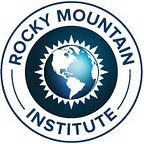Transforming Transportation
Moving people and goods with low or no emissions
Of all the myriad ways that energy is produced and used, transportation has the greatest promise to change our lives for the better, and yet it is languishing under business as usual.
The Paris Agreement did not address global shipping and aviation at all, while the electric car is just now entering mass production even though the concepts that make that possible were pioneered in the 1970s—by RMI’s own Amory Lovins.
We are working with our partners and supporters to exceed the promise of the electric car by developing fully shared, autonomous, and electric mobility services. But heavy transport cannot rely entirely on electric solutions. With your help, we also are intervening in the shipping, trucking, and aviation markets in the U.S. and around the world to shift them away from fossil fuels and to enhance efficiency in time to save our climate. Following are a few of the ways we’re making an impact, with the support of people like you.
Pioneered an “airport approach” to get biofuels to replace jet fuel,
with Geneva International Airport being the first to implement the model. We worked with the Swiss airport, as well as Seattle-Tacoma International Airport and other partners, to find the best way to get the industry to start switching to biofuels, which can reduce emissions by 80 percent — important for an industry that emits 800 million tons of CO2 annually.
Enabled 19 North American trucking fleets to boost their fuel economy for the ninth year in a row and save nearly $500 million.
We did this by continuing to develop and host Confidence Reports, the go-to source for the trucking industry to learn about efficiency technologies and fuel economy.
Worked with the City of Austin to help enable shared, electric, and autonomous mobility services.
From supporting a City Council resolution, to setting a goal to get 330 city vehicles on the path to electrification and developing cutting-edge urban design and parking codes, we are partnering with this far-sighted city and working inside it, too. We created a program for rideshare drivers to finance buying electric vehicles and helped Austin employers like Whole Foods meet their staff’s commuting needs with Mobility-as-a-Service commuting options. It all sets the stage for a thoroughly transformed mobility future.
Worked with the Indian government to develop an action plan to take the country to 100 percent electric vehicles by 2030.
This could save as much as 1 gigaton of carbon emissions and approximately $330 billion in fuel costs between 2017 and 2030. Working with India’s premier think tank, several cabinet ministers, and industry leaders, we helped craft a plan to make India’s vast mobility system one of the cleanest in the world.
Proved that 10.1 mpg is possible in the North American trucking industry
through Run on Less, a first-of-its-kind, livestreamed roadshow to demonstrate fuel efficiency. By monitoring fuel economy, weather conditions, and other variables, we proved that if the 1.7 million trucks on North American highways today achieved the same level of efficiency as the trucks in the Run, they would save 9.7 billion gallons of diesel fuel, $24.3 billion, and 98 million tons of CO2 each year.
Launched the first publicly available and comprehensive data source on the operational efficiency of ships
throughout the world. Called BetterFleet, the free-to-access data lets shippers choose ships based on their energy efficiency, increasing access to energy efficiency in this market.
Developed emissions solutions in China’s freight and logistics industry.
After a workshop in Shenzhen, RMI is working on freight and logistics optimization in Beijing and urban freight electrification in Shenzhen to decongest and reduce emissions in China’s fast-growing and heavily polluting freight sector.
Executed a successful rideshare pilot, Door to Downtown, in Boulder, CO.
We worked with the city as it subsidized trips with ridshare partners like Lyft for trips to downtown. Because Mobility as a Service came at the same cost as driving oneself, minus the hassle of parking, we were able to study the behavior and incentives that will move people to use shared vehicle fleets widely in the future.
Commenced managing an aviation-focused nonprofit carbon-reduction platform,
The Good Traveler, that enables corporations and airline passengers to pay for projects that mitigate the greenhouse gas emissions associated with their travel. By eventually integrating sustainable biofuels for aviation into this platform, we’ll be funding this important market intervention.
